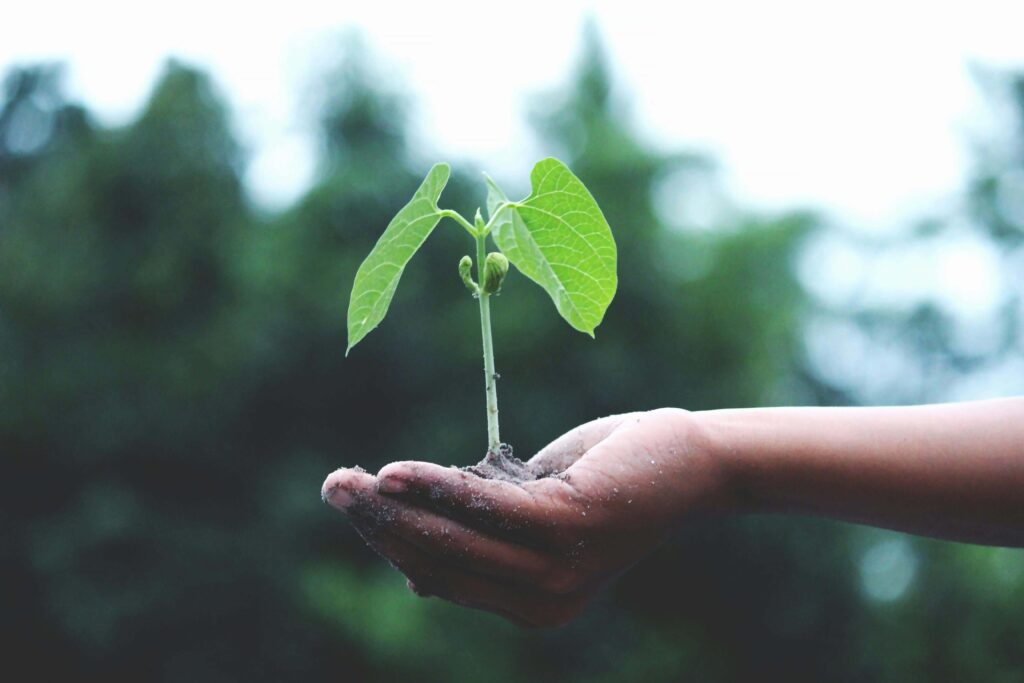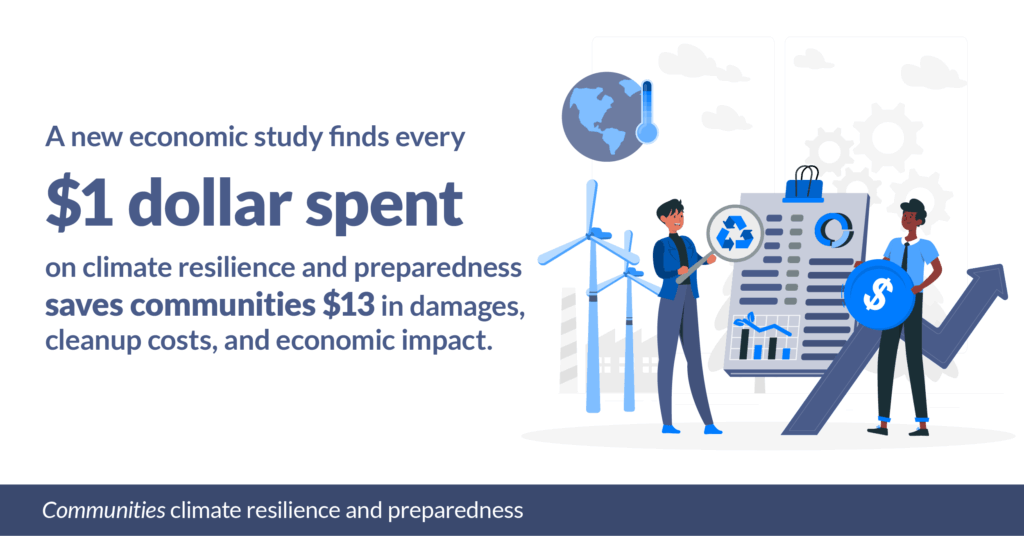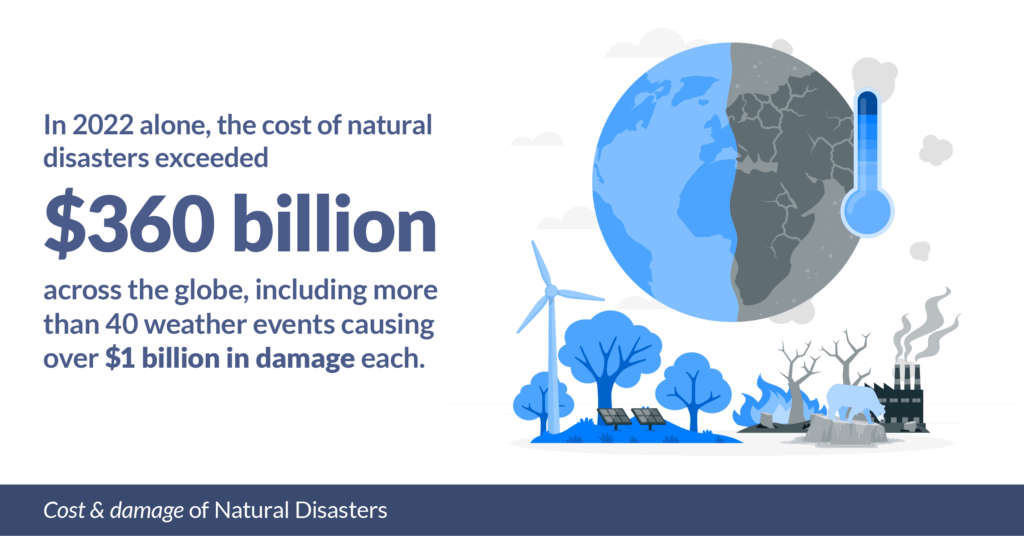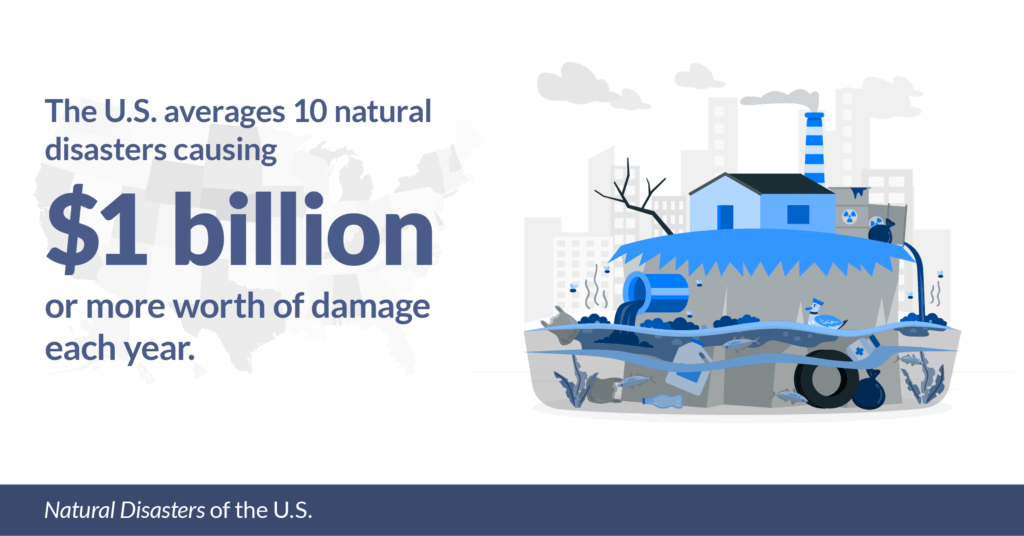Disaster Planning and Resilience for Strong Communities

When disaster strikes, our communities need more than just emergency response—they need connection, support, and a path forward. For community leaders, colleges, everyday citizens, and social workers alike, building disaster resilience isn’t someone else’s job—it’s our shared responsibility.
Disasters tear through the fabric of community life. Beyond physical damage, they create trauma, displace families, break social bonds, and set up barriers to recovery that can persist for years. These hardships hit hardest on those already vulnerable: older adults, children, people with disabilities, those with limited resources, and historically marginalized groups.
Community leaders, whether elected officials, nonprofit directors, faith leaders, or informal neighborhood advocates, are uniquely positioned to mobilize local resources and knowledge before crisis hits. Colleges and universities can serve as both knowledge hubs and physical safe havens during emergencies. And regular citizens—with the right tools, information, and connections—can become the backbone of community resilience, checking on neighbors, sharing resources, and driving grassroots recovery efforts.

Social work students and professionals bring valuable expertise to this ecosystem of support, offering trauma-informed approaches and advocacy skills that help ensure no one falls through the cracks during recovery.
The resources gathered here are designed for anyone committed to strengthening their community’s ability to weather disasters. You’ll find practical tools for coordinating local response networks, supporting emotional recovery, accessing emergency aid, and rebuilding with equity in mind. Because true resilience isn’t just about surviving tough times—it’s about creating communities where everyone can bounce back stronger, no matter what challenges come our way.
Community resilience score: https://hazards.fema.gov/nri/community-resilience
Social Workers Play a Critical Role in Disaster Relief and Emergency Preparedness
This article discusses how social workers integrate social and mental health services into disaster response plans, advocating for vulnerable populations and equitable resource access.
Building Community Resilience to Disasters
This study provides a roadmap for leaders to enhance community resilience, highlighting social workers’ roles in promoting health security and community well-being.
The Role of Social Work in Disaster Management
An overview of how social workers contribute to disaster planning, management, relief, and recovery, emphasizing their role in community restoration and public health outreach.
Disaster Preparedness in Social Work: A Scoping Review
This scoping review explores social work literature on disaster preparedness, emphasizing the need for proactive engagement and localized, dynamic processes in disaster contexts.
Social Workers’ Intervention During Natural Hazards
Examines the roles social workers assume during natural hazards, including educator, counselor, and broker, to enhance community resilience and social functioning.
Preparedness and Community Resilience in Disaster-Prone Areas
Highlights the importance of social workers in promoting community resilience through building social capital and developing tailored resources in disaster-prone areas.
Disasters – National Association of Social Workers
Outlines the critical role of social workers in disaster recovery efforts, emphasizing their contribution to restoring health systems and social service networks.
Enhancing Disaster Resilience by Reducing Stress-Associated Health Impacts
Discusses how social workers can improve disaster resilience by addressing stress-related health impacts through targeted interventions and support systems.
Disaster Relief Social Workers and Their Roles
Explores the goals and responsibilities of disaster relief social workers, focusing on supporting victims and coordinating community resources for effective recovery.
Disaster Resilience – MSW Dual Degree – Tulane University
Highlights the central role of social workers in facilitating community resilience post-disaster, combining counseling and resource coordination to support recovery.

Guides
FEMA’s Climate Resilience Resource Guide
A comprehensive guide by FEMA offering tools, training, and data to help communities build resilience against climate-driven disasters through informed planning and investment strategies.
Planning for Hazards: Land Use Solutions for Colorado
Created by the Colorado Department of Local Affairs, this resource provides land-use strategies and planning tools to integrate hazard mitigation and disaster resilience into local policies.
Building Community Resilience: National League of Cities
An overview of resilience initiatives and frameworks for cities to strengthen their ability to withstand and recover from natural disasters and long-term climate impacts.
Disaster Resilience Framework – U.S. GAO
A strategic framework outlining principles and approaches to federal disaster resilience planning, emphasizing risk reduction and investment in long-term solutions across sectors.
National Institute of Building Sciences – Resilience Programs
Outlines research, reports, and policy recommendations for improving infrastructure and community resilience through innovative planning, design, and construction standards.
MIT Urban Risk Lab – Disaster Resilience Projects
Showcases research-driven projects and tools developed by MIT’s Urban Risk Lab aimed at increasing urban resilience through innovative, tech-enabled disaster response and preparedness.
NOAA Climate Resilience Toolkit
Provides case studies, tools, and planning resources to help communities and decision-makers integrate climate resilience into development and emergency management efforts.
APA: Hazard Mitigation and Disaster Recovery Planning
American Planning Association resource hub focused on integrating hazard mitigation and recovery planning into local comprehensive planning processes and development strategies.
Community Resilience Estimates – U.S. Census Bureau
Presents statistical insights into community vulnerability and resilience capacities, aiding planners in identifying areas of greater risk and need for preparedness measures.
The Resilience Shift – Infrastructure and Systems Thinking
Explores how systems thinking and infrastructure innovations can drive disaster resilience across sectors, featuring insights from global experts and practitioners.
Organizations
National Science Foundation (NSF) – Disaster Risk and Resilience
The NSF invests in fundamental research to understand and predict natural hazards, promoting resilience through science and innovation.
Initiative for Community and Disaster Resilience (ICDR) – Portland State University
ICDR focuses on interdisciplinary research and educational outreach to enhance community resilience against natural disasters.
FEMA National Disaster & Emergency Management
FEMA offers comprehensive training and professional development programs to elevate emergency management into a recognized profession.
Center for Disaster Resilient Communities – University of Washington
This center unites expertise in disaster science to support the development of resilient communities through research and partnerships.
United Way of the Columbia-Willamette – Disaster Resilience
Addressing equitable disaster resilience by centering at-risk communities and recognizing barriers faced by people of color.
The Partnership for Inclusive Disaster Strategies
A U.S. disability-led organization focused on equity for people with disabilities in all disaster planning and response activities.
Institute for Resilient Organizations, Communities, and Environments (IROCE) – University of Oregon
IROCE links applied social science research and resources to help organizations and communities adapt and thrive amid adversity.
Center for Disaster Resilience – University of Maryland
Takes a multidisciplinary approach to hazards, integrating understanding of hazards with social contexts to improve preparedness and response.
National Center for Disaster Preparedness (NCDP) – Columbia University
Works to understand and improve the nation’s capacity to prepare for, respond to, and recover from disasters.
Oregon Housing and Community Services – Disaster Recovery and Resilience
Established to support housing and community recovery following the 2020 wildfires, focusing on disaster recovery and resilience.
Global Facility for Disaster Reduction and Recovery (GFDRR)
A global partnership managed by the World Bank, GFDRR assists developing countries in understanding and reducing vulnerabilities to natural hazards and climate change through technical and financial support.
National Institute of Standards and Technology (NIST) – Community Resilience Program
NIST’s Community Resilience Program focuses on research and guidance to help communities prepare for, withstand, and recover from disasters by improving buildings and infrastructure systems.

Scholarly Articles
Disaster Resilience Framework Indicators for a City’s Disaster Resilience Assessment
This study develops disaster resilience framework indicators for the City of Tshwane to assess its current disaster resilience and contribute to sustainable development planning strategies.
Building Community Resilience to Disasters
This article provides a roadmap for federal, state, and local leaders to enhance community resilience for health security threats, detailing options for building resilience in key areas.
Building Disaster Resilience Through Emergency Plan Updates
This research proposes a conceptual framework viewing the emergency plan update process as a complex adaptive system, aiming to elucidate resilient planning methodologies.
The Disaster Resilience Framework: A Tool to Promote Foresight and Accountability
GAO’s Disaster Resilience Framework is designed to promote a forward-looking, whole-systems approach to complex disaster resilience challenges, aiding decision-makers in identifying opportunities to enhance resilience.
Exploring and Enhancing Community Disaster Resilience
This study explores differences in community disaster resilience aspects and proposes enhancements tailored to various community types, validated using the 2021 Zhengzhou flood event.
Enhancing Disaster Resilience by Reducing Stress-Associated Health Impacts
The article recommends eight actions to improve resiliency by incorporating stress alleviation into disaster planning, based on a review of key literature on disasters and associated stress effects.
Planning for Disaster Recovery: Planner Perspectives on Integrating Planning and Recovery
This article examines the integration of planning tools in pre- and post-disaster recovery plans, highlighting the lack of broad integration that could improve resilience and expedite recovery.
Measuring Community Disaster Resilience at Local Levels
The paper identifies key features and characteristics of Community Disaster Resilience frameworks from the literature to develop resilience assessment methodologies at local levels.
Disaster Resilience in Climate-Vulnerable Community Contexts
This paper provides a comprehensive conceptual analysis of disaster resilience in climate-vulnerable communities, offering insights into resilience-building strategies tailored to these contexts.
Preparedness and Community Resilience in Disaster-Prone Areas
This study emphasizes the importance of cross-sector collaboration, planning, and preparation in enhancing community resilience in areas prone to disasters.
Videos
Coastal Resilience Center Disaster Recovery Indicators
This video introduces the Disaster Recovery Tracking Tool, detailing 79 metrics that assess community recovery post-disaster, aligned with FEMA’s recovery support functions.
Plan Integration for Resilience Scorecard
An overview of a method aiding communities in integrating various plans—transportation, parks, economic development—to collaboratively reduce hazard vulnerabilities.
S&T Impact: Disaster Resilience
Highlights how the Science and Technology Directorate enhances community resilience to natural disasters through supportive technologies and tools for planning and mitigation.
NIST Disaster Resilience Program
Provides insights into NIST’s initiatives assisting communities in preparing for hazards like windstorms and floods, aiming to mitigate disastrous outcomes.
Equitable Resilience Builder (ERB) Tool Overview
An introduction to the Equitable Resilience Builder, a free tool designed for inclusive resilience planning, emphasizing equitable approaches.
Videos: Checklist on Disaster Displacement
Educational videos summarizing key actions governments and stakeholders can take to reduce disaster-induced displacement.
Technical Resilience Navigator Video
An overview of the Technical Resilience Navigator, a web-based tool aiding users in identifying site-specific vulnerabilities and threats to critical loads.
Resilience Planning Can Help Create a Disaster-Ready Nation
Federal officials discuss progress on Climate Adaptation and Resilience Plans, highlighting actions to advance national resilience goals.
Prioritizing Social Capital for Disaster Resilience
A webinar discussing the role of social capital in disaster resilience and necessary systemic changes to enhance community preparedness.
RCRC Video/Media
A series highlighting the importance of planning for children’s unique needs in emergencies, fostering community resilience through informed strategies.
Organizations
Natural Disasters and Local Resiliency
Komla Dzigbede’s 2025 book examines how local governments can adapt, recover, and strengthen resilience in the face of increasing natural disasters.
Disaster Resilience: A National Imperative
This 2012 publication by the National Academies Press discusses strategies to enhance the nation’s resilience to disasters through improved planning and policy frameworks.
Climate Resilience for an Aging Nation
This 2023 book provides a roadmap for action by focusing on the elderly in disaster preparation and recovery, emphasizing their central role in resilience planning.
Healthy, Resilient, and Sustainable Communities After Disasters
Published in 2015, this book identifies recovery practices and programs that enhance public health and contribute to community resilience post-disaster.
Planning for Post-Disaster Recovery: Next Generation
This updated manual offers practical explanations of the benefits and limitations of planning for unpredictable events, with case studies from various communities.
The Routledge Handbook of Urban Disaster Resilience: Integrating Mitigation, Preparedness, and Recovery Planning
A comprehensive 2022 guide that integrates mitigation, preparedness, and recovery planning to enhance urban disaster resilience.
Why Vulnerability Still Matters: The Politics of Disaster Risk Creation
This 2022 book explores the political aspects of disaster risk creation and the ongoing relevance of vulnerability in disaster resilience discussions.
The Blessings of Disaster: The Lessons That Catastrophes Teach Us and Why Our Future Depends on It
Michel Bruneau’s 2022 publication discusses how disasters can provide valuable lessons for future resilience and preparedness.
Global Risk Management: The Role of Collective Cognition in Response to COVID-19
This 2022 book examines how collective cognition influences global risk management, with a focus on responses to the COVID-19 pandemic.
The Continuing Storm: Learning from Katrina
Kai Erikson and Lori Peek’s 2022 book reflects on the lessons learned from Hurricane Katrina and their implications for future disaster resilience.
Books
Natural Disasters and Local Resiliency
Komla Dzigbede’s 2025 book examines how local governments can adapt, recover, and strengthen resilience in the face of increasing natural disasters.
Disaster Resilience: A National Imperative
This 2012 publication by the National Academies Press discusses strategies to enhance the nation’s resilience to disasters through improved planning and policy frameworks.
Climate Resilience for an Aging Nation
This 2023 book provides a roadmap for action by focusing on the elderly in disaster preparation and recovery, emphasizing their central role in resilience planning.
Healthy, Resilient, and Sustainable Communities After Disasters
Published in 2015, this book identifies recovery practices and programs that enhance public health and contribute to community resilience post-disaster.
Planning for Post-Disaster Recovery: Next Generation
This updated manual offers practical explanations of the benefits and limitations of planning for unpredictable events, with case studies from various communities.
The Routledge Handbook of Urban Disaster Resilience: Integrating Mitigation, Preparedness, and Recovery Planning
A comprehensive 2022 guide that integrates mitigation, preparedness, and recovery planning to enhance urban disaster resilience.
Why Vulnerability Still Matters: The Politics of Disaster Risk Creation
This 2022 book explores the political aspects of disaster risk creation and the ongoing relevance of vulnerability in disaster resilience discussions.
The Blessings of Disaster: The Lessons That Catastrophes Teach Us and Why Our Future Depends on It
Michel Bruneau’s 2022 publication discusses how disasters can provide valuable lessons for future resilience and preparedness.
Global Risk Management: The Role of Collective Cognition in Response to COVID-19
This 2022 book examines how collective cognition influences global risk management, with a focus on responses to the COVID-19 pandemic.
The Continuing Storm: Learning from Katrina
Kai Erikson and Lori Peek’s 2022 book reflects on the lessons learned from Hurricane Katrina and their implications for future disaster resilience.
Podcasts
Disaster Podcasts – Natural Hazards Center
A collection of podcasts discussing disaster response, emergency management, community resilience, and life in emergency operations, featuring experts and practitioners in the field.
Resilience Roundtable Podcast Series – American Planning Association
This series features conversations with planners and allied professionals dedicated to building resilience, even in the face of devastating natural hazards.
Before, During & After – FEMA
A podcast for emergency managers offering insights into the future of emergency management and discussions on preparing for emerging threats.
GFDRR Podcasts – Global Facility for Disaster Reduction and Recovery
Features resilience and disaster risk management experts discussing global strategies and practices for disaster reduction and recovery.
Disaster Risk Reduction for Vulnerable Populations – PADF
An interview discussing the design of risk reduction strategies targeting the needs of vulnerable populations in Latin America and the Caribbean.
DTAC Podcasts and Videos – SAMHSA
Offers audio podcasts and videos for disaster behavioral health professionals, emergency managers, and the public on building resilience before, during, and after disasters.
Voices in Resilience – UNDRR
A podcast series by the UN Office for Disaster Risk Reduction sharing stories on preventing environmental disasters and building resilience.
Curious Conversations: Liesel Ritchie on Social Capital and Community Resilience – Virginia Tech
Liesel Ritchie discusses the role of social capital in community resilience and the differences between natural and other types of disasters.
Resilience: The Global Adaptation Podcast – UNEP
A podcast bringing inspiring stories from people worldwide adapting to climate change in practical, creative, and innovative ways.
Holistic Disaster Resilience featuring Bangkok – Resilient Cities Network
A conversation with Dr. Tavida Kamolvej, Deputy Governor of Bangkok, on the city’s disaster risk and resilience approach.
